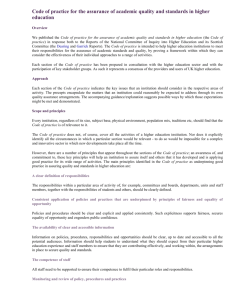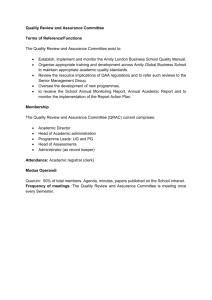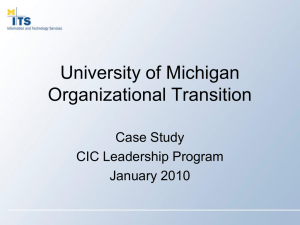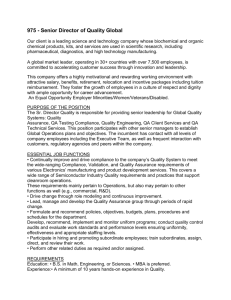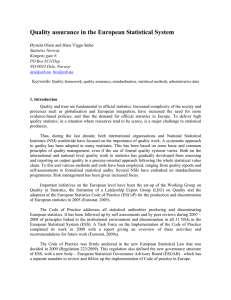ESS Approach to Quality Assurance Framework
advertisement
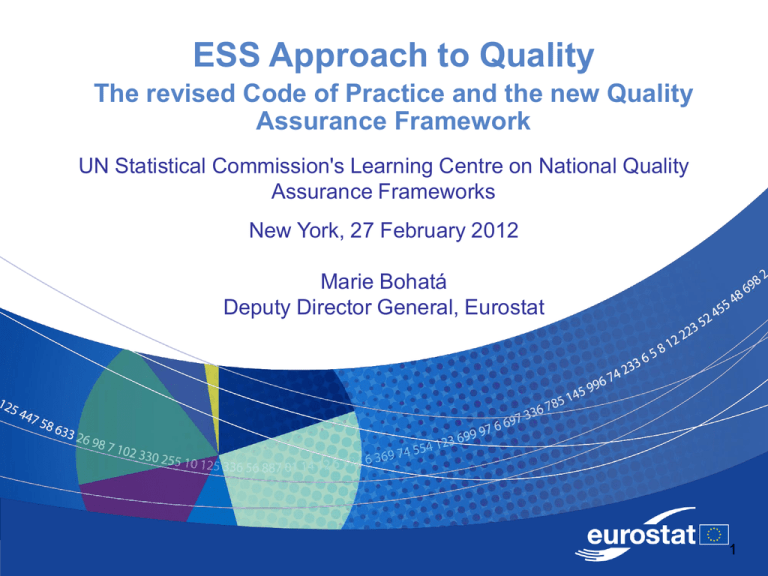
ESS Approach to Quality The revised Code of Practice and the new Quality Assurance Framework UN Statistical Commission's Learning Centre on National Quality Assurance Frameworks New York, 27 February 2012 Marie Bohatá Deputy Director General, Eurostat 1 Major European quality initiatives Leadership Group on Quality (1999 – 2001) European Conferences on Quality (from 2001 onwards) European Statistics Code of Practice (2005) European Statistical Governance Board (2008) New European Statistical Law (2009) Sponsorship on Quality (2009 – 2011) – (Limited) revision of the Code of Practice – Recommendations on quality management and quality reporting Communication “Towards robust quality management for European Statistics” (2011) 2 The Sponsorship on Quality High-level Task force co-chaired by Statistics Norway and Eurostat 3 working areas – Theme I – Code of Practice – Theme II – Quality assurance framework – Theme III – Communicating quality 3 Code of Practice Self-regulatory instrument 15 Principles cover the standards applicable to – Institutional environment – Statistical processes – Statistical outputs Principles supported by indicators showing how compliance can be demonstrated 4 Code of Practice – compliance Self-assessments in 2005 External peer reviews in 2006-2007 Annual monitoring and reporting (Eurostat and ESGAB) Next round of peer reviews envisaged in 2013 5 Code of Practice – revision of 2011 Reinforced quality management, professional independence and access to administrative data 2001 Quality Declaration as a preamble Alignment with the ESCB Statistical Quality Framework 6 Quality Assurance Framework Level 1 = Principles (standards) Level 2 = Indicators (how the standards can be demonstrated) Level 3 = Quality Assurance Framework (what methods and tools can be used) 7 Quality Assurance Framework – features Describes for each Indicator of the Code activities and methods/tools that facilitate its implementation. Can substantially contribute to the promotion of a common view and understanding of quality management within the ESS and the sharing of this with other important partners (including other national data producers). The open and flexible nature of the QAF allows the specific selection of recommended activities/methods/tools that better fit the context of a specific statistical authority. 8 Quality Assurance Framework – example Principle 8 Appropriate statistical procedures, implemented from data collection to data validation, underpin quality statistics Indicator 8.6 Revisions follow standard, well-established and transparent procedures Methods of implementation • • • Guidelines on revision of published statistics exist, are applied and made known to users Revisions accompanied by explanations made available to users Quality indicators on revisions are calculated and published 9 Quality Assurance Framework – example Principle 8 Appropriate statistical procedures, implemented from data collection to data validation, underpin quality statistics Indicator 8.6 Revisions follow standard, well-established and transparent procedures Methods of implementation • Guidelines on revision of published statistics exist, are applied and made known to users • Revisions accompanied by explanations made available to users • Quality indicators on revisions are calculated and published 10 Communicating quality Review of ESS recommendations and requirements on quality reporting Distinction of producer and user oriented quality reports Single metadata structure to be used to derive both Methodological Manual to be prepared Use of common ESS IT tools User oriented reports to be disseminated to the wide audience Producer oriented reports only to the producers Regular interaction with the target groups 11 Theme III – Communicating quality Review of the content of quality reports, including quality indicators (European Statistical Advisory Committee consulted) Implementation of websites declaring compliance with the Code of Practice: for ex. INSEE France 12 Summary The revised Code of Practice put in place The Quality Assurance Framework provides practical guidance for the implementation of the Code Both are applicable across the statistical authorities Process/domain-specific quality management approaches can be considered as a further level of quality assurance leading to certification/labelling 13
